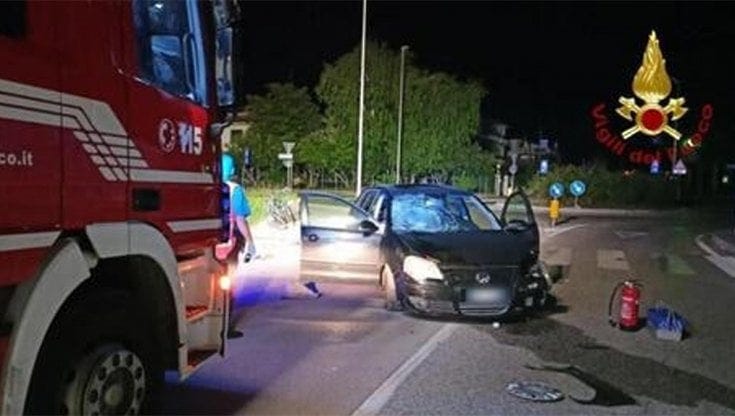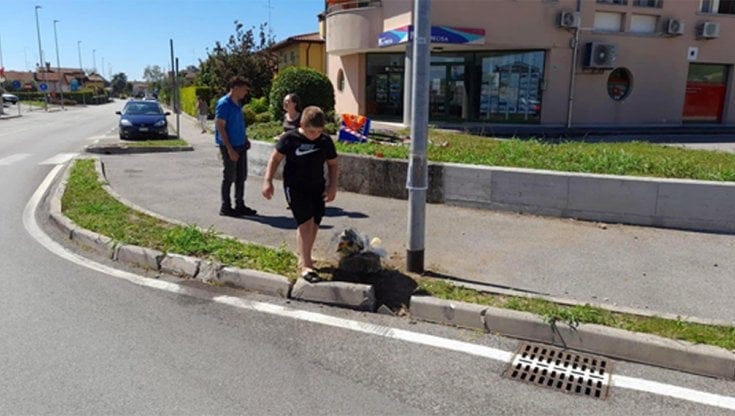A Drunk U.S. Servicemember Kills a 15-Year-Old Italian Boy
Wait till you read what it said on her toxicology report.
Yesterday, a terrible thing happened in Porcia, a town in Northern Italy about nine miles from the U.S. Air Force’s Aviano Air Base.
Such tragedies are relatively rare in Italy. When they do happen, it’s national news, and the country has every right to mourn.
A twenty-year-old U.S. servicewoman named Julia Bravo, stationed at the Air Force base, is under house arrest after killing a fifteen-year-old boy in a drunk driving accident.
She was four times over the legal limit for alcohol.
It was 2:30AM, and the victim, Giovanni Zanier, had been coming home from a local dance club with a group of friends. In the U.S., you can be sure that any fifteen-year-old boy gallivanting around at 2:30AM is up to no good, but in Italy, it is customary for young Italians to stay up till all hours socializing. Giovanni was pushing his friend’s bike down a bike path, walking well within the painted lines. But then, U.S. servicemember Julia Bravo came careening around a traffic circle at a high rate of speed, lost control of her vehicle, and sent Giovanni flying.
“That woman was completely drunk when she took the wheel. She couldn’t even turn the ignition on,” an eyewitness told the Il Gazzettino newspaper.
Questions remain. Who was that witness? Why had Bravo been allowed to drive? Whose car was she driving? Why was she off the base to begin with?
The U.S. Embassy has yet to issue a statement, which I find infuriating. Of this you may be sure: U.S. servicemembers, while necessary to both American interests and those of the European Union, are often a burden to the villages adjacent to military bases. Drunken behavior, sexual assaults, property damage and other flagrant law breaking occur with horrifying regularity. Rarely are these cases dealt with in an appropriate manner, and many are just hushed up altogether.
It doesn’t help that publicly, U.S. officials say there are no U.S. military bases in Italy. What a ridiculous and clumsy lie. The United States has over 800 military bases across the world, seven of them in Italy alone (that we know of).
If American servicemembers didn’t sexually assault the locals or drive drunk and kill people, their presence wouldn’t be a problem. But the legal membrane encapsulating these bases and protecting them from Italian law enforcement leaves too many injustices unaddressed. Under the terms of a NATO treaty between the U.S. and Italy, Julia Bravo’s case will likely be transferred to U.S. jurisdiction if an indictment is handed down.
Giovanni Zanier’s mother, Barbara Scandella, knows that. “I don’t trust the American justice system,” she reported to Italian newspaper, Corriere della Sera. “We all know that the soldiers on the Aviano base in this area do what they like, that they don’t respect the rules. We want [U.S. servicemember Julia Bravo] to be tried in Italy and given the sentence she deserves.”
It was after a 1998 air disaster that this treaty was invoked. Twenty people were killed when a United States Marine Corps EA-6B Prowler aircraft, flying too low and against regulations (by their own admissions, the pilots just wanted to “have fun” and “take videos of the scenery”) clipped the wire supporting a cable car. All passengers fell to their deaths. The pilot, Captain Richard J. Ashby, and his navigator, Captain Joseph Schweitzer, who were tried in the U.S., were found not guilty.
Not guilty of involuntary manslaughter.
Not guilty of negligent homicide.
After enormous public outcry, the two were later found guilty on lesser charges, such as obstruction of justice and conduct unbecoming, even though they had willfully destroyed a videotape recorded from the plane that implicated them both.
For context, imagine that Canada had an air base in Kentucky, and most nights, hordes of drunk, obstreperous Canadians went into town, got even drunker, and then started raping and killing the locals. That would be a huge PR problem for Canada, wouldn’t it?
That’s exactly what’s happening here in Italy. Too many American servicemembers—admittedly young, admittedly clueless—treat Italy like one big drunken lasagna-scented beach party. Where are their superior officers? A twenty-year-old servicemember shouldn’t even be allowed off base.
On the night her son died, Barbara Scandella didn’t even know he’d been struck until a friend called her around 4AM. The friend’s niece had noticed three ambulances down the street and recognized Giovanni’s friends bawling their eyes out. Barbara, her husband Sergio, and their ten-year-old son raced to the emergency room.
For a while, no one had the courage to tell them Giovanni was dead.
He loved Latin-American music, dancing, computer science, and parkour, a form of urban athlete training that he did with his friends. Barbara had recently ordered a necklace for him from Amazon that has yet to arrive.
“The tears won’t stop,” she told Italian newspaper, La Repubblica. “I miss him so much … I wake up constantly and keep looking for him, expecting him to arrive at any moment.
“If I could talk to him again, I would say: I love you. No one can give him back to me. And such a thing can never be forgiven.”
Copyright © 2022 Stacey Eskelin
I would love for you to weigh in here. This is a serious issue that needs as much of our time and attention as possible. What are your thoughts?






"No one can give him back to me. And such a thing can never be forgiven." True. Nothing anyone will or could ever do will bring Giovanni Zanier back. The circumstances and the clumsy manner in which the American military justice system will undoubtedly handle the incident will only make matters worse.
Wound, meet salt.
When I was an Army Reserve second lieutenant, I went out drinking one night with a woman. I drove back onto base at about 4am, so drunk that I have no idea how I kept my car between the lines or got past the base MPs at the gate. If they'd held a lighter up to me, the alcohol on my breath would've detonated. For some reason, they waved me past without so much as a second look.
I woke up the next morning with a raging hangover and the clarity to realize just how fucking stupid I'd been.
1. If I'd been busted for DUI, my military career would've ended on the spot.
2. I could easily have killed or injured someone.
3. I had to face my platoon formation that morning with a hangover that would've laid the Dallas Cowboys low...and all 40+ enlisted men knew it. They did their level best to make my day miserable...and I deserved every fucking minute of it.
Since that day, I don't drink and drive, especially when I'm driving my wife. She thinks I'm being overly protective, but she also doesn't know the story. I learned my lesson- fortunately, not the hard way.
That is a tragedy, and the accident is obscene. So sorry.
Honestly, drunk driving with vehicular homicide should void immunity for military and diplomats, in my opinion. It is sometimes a problem in DC with diplomats. And look at the grotesque US response to Harry Dunn's murder by car, by a diplomat stationed in England.